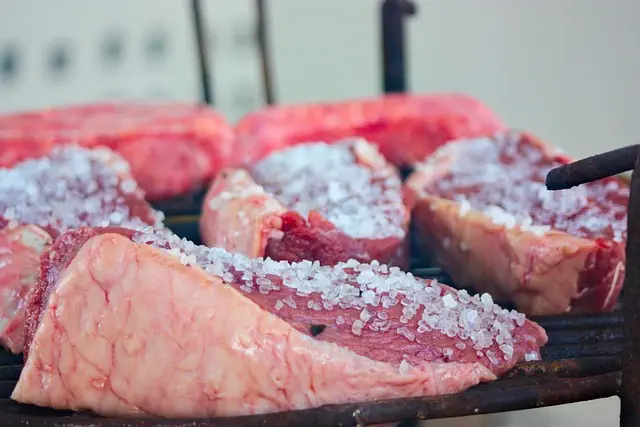Kratom remains legally available in Indiana with a regulatory framework that balances consumer choice and public safety. The state's legislation explicitly addresses its status, reflecting an understanding of the herb's role within the international market, particularly its reliance on high-quality leaves from Vietnam. Indiana's approach is mindful of global trade dynamics, including cultivation practices, harvesting, and exportation, which are influenced by international agreements and policies. The supply chain for kratom in Indiana involves careful cultivation in Vietnam, followed by processing and quality control measures to ensure the product's efficacy upon reaching U.S. markets. In Indiana, vendors comply with state and federal regulations to uphold consumer safety, contributing to the herb's accessibility within local stores. For those in Indiana seeking high-quality kratom, it is crucial to consider the origin of the leaves and the cultivation methods used, as these factors significantly affect potency. Ethical sourcing from Vietnam's optimal climates ensures the preservation of alkaloids, and consumers are encouraged to verify lab test results for product purity and safety. This responsible approach supports the sustained legality of kratom in Indiana, aligning with the broader context of maintaining a reliable and ethical supply chain within the legal framework established by the state.
exploring the intricate legalities surrounding kratom in Indiana reveals a nuanced tapestry, with Vietnam playing a significant role in its global trade. This article delves into the journey of Vietnamese kratom leaves from their origins to becoming readily available in Indiana stores. It provides a detailed examination of the potency and quality of these leaves, offering Indiana consumers valuable insights to navigate this market responsibly within the legal framework established by state laws. Understanding the complex supply chain and assessing the product’s consistency and safety are paramount for consumers keen on kratom’s effects and benefits.
- Exploring the Legal Landscape of Kratom in Indiana: Understanding Vietnam's Role in the Kratom Trade
- The Journey from Vietnamese Farms to Indiana Stores: Sourcing and Supply Chain of Vietnam Kratom Leaves
- Assessing the Potency and Quality of Vietnam Kratom Leaves: A Comprehensive Analysis for Consumers in Indiana
Exploring the Legal Landscape of Kratom in Indiana: Understanding Vietnam's Role in the Kratom Trade

In recent years, the legal status of kratom has been a subject of considerable debate and scrutiny across various states within the United States. Indiana, specifically, has navigated this complex issue with evolving regulations. As of the current knowledge cutoff, kratom is legal in Indiana, with specific legislation defining its legality. The state has approached the matter with caution, recognizing the fine line between regulating a substance and infringing upon individuals’ rights to access products they perceive as beneficial. Indiana’s stance allows consumers to purchase and use kratom while monitoring its effects and ensuring public safety.
The trade of kratom leaves, which originate from the Mitragyna speciosa tree native to Southeast Asia, particularly Vietnam, plays a pivotal role in the global market. Vietnam has become one of the prominent sources for kratom due to its favorable climate and agricultural conditions. The country’s involvement in the trade underscores the importance of understanding international regulations that govern the cultivation, harvesting, and exportation of kratom. Indiana’s legal framework regarding kratom must therefore consider not only state-level policies but also the broader implications of international trade laws and agreements. This interplay between local legislation and global commerce is crucial in maintaining a consistent and sustainable supply of kratom while ensuring that consumer interests are safeguarded.
The Journey from Vietnamese Farms to Indiana Stores: Sourcing and Supply Chain of Vietnam Kratom Leaves

In recent years, the demand for kratom, a tropical evergreen tree native to Southeast Asia, has surged within the United States. Among the regions supplying this popular herb is Vietnam, where optimal growing conditions yield high-quality kratom leaves. The journey of these leaves from Vietnamese farms to stores in Indiana is a testament to the complexities and efficiencies of modern global trade. It begins with meticulous cultivation practices in the fertile fields of Vietnam, where the climate and soil are conducive to nurturing the kratom plant, resulting in a product that meets stringent quality standards. Once harvested, the leaves undergo drying and processing to preserve their alkaloid content, which is crucial for their efficacy. The processed leaves are then carefully packaged and prepared for international shipping.
Upon reaching the U.S., these kratom leaves traverse a supply chain that includes customs clearance, compliance with regulations, and logistics coordination to ensure they arrive fresh and potent. In Indiana, where kratom is legal, adherence to state and federal guidelines is paramount to ensure consumer safety. The state’s kratom vendors, aware of the legal status of kratom in Indiana (kratom legal in Indiana), operate within a regulated framework that mandates transparency in sourcing and product labeling. This commitment to regulatory compliance enhances consumer trust and satisfaction, as evidenced by the growing number of Indiana stores that offer kratom products derived from these Vietnamese farms. The seamless integration of international agriculture with U.S. retail ensures a consistent and legal supply of kratom for enthusiasts across the state.
Assessing the Potency and Quality of Vietnam Kratom Leaves: A Comprehensive Analysis for Consumers in Indiana

When exploring the potency and quality of Vietnam Kratom leaves, it’s crucial for consumers in Indiana, where kratom is legal, to engage in a thorough analysis. The first factor to consider is the cultivation conditions; Vietnam’s diverse climates provide ideal environments for kratom plants to flourish, yielding leaves with varying alkaloid profiles, which directly influence potency. Indiana users seeking high-quality kratom should look for strains that originate from regions in Vietnam known for their fertile soil and favorable weather patterns, as these conditions contribute to the efficacy of the kratom leaves.
Furthermore, the quality of Vietnam Kratom can be assessed by examining the harvesting and processing methods employed. Ethical cultivation practices ensure that the alkaloid content remains intact, preserving the plant’s natural properties. Reputable vendors often provide lab test results, confirming the alkaloid concentrations and verifying that their products are free from contaminants. For consumers in Indiana, it’s essential to prioritize vendors who adhere to these quality standards, as they offer kratom legal in Indiana that is both safe and effective for consumption. By doing so, users can confidently enjoy the benefits of this botanical, while also contributing to the responsible use and advocacy of kratom’s legality within the state.
In conclusion, the intricate journey of Vietnam’s kratom leaves from the fertile farms to the shelves of Indiana stores sheds light on a burgeoning market that straddles international borders. The legal status of kratom in Indiana, particularly with regard to kratom legal in Indiana, necessitates careful scrutiny and regulatory oversight. Consumers seeking the benefits of kratom must be discerning, as the quality and potency of these leaves can vary significantly. Our analysis underscores the importance of stringent quality control measures from sourcing to sale, ensuring that the kratom available in Indiana is both safe and efficacious. As this market continues to evolve, it is imperative that stakeholders—ranging from producers in Vietnam to consumers in Indiana—prioritize transparency and responsible consumption to navigate the complex landscape of kratom trade responsibly.






